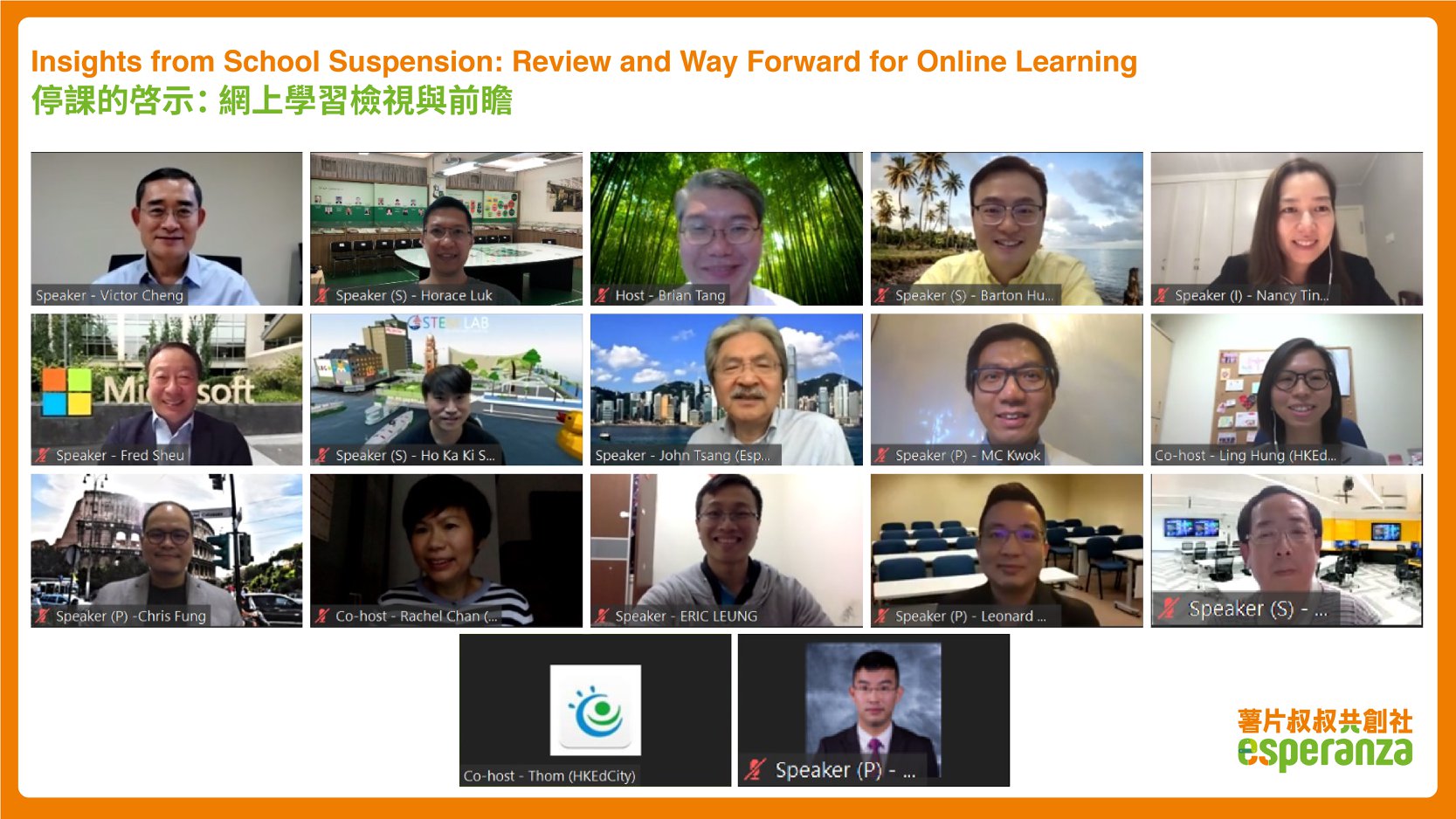
You can watch it on: https://www.hkedcity.net/
[3 April 2020, Hong Kong] With the coronavirus, all schools have been suspended for over two months, creating unprecedented challenges for educators. To help teachers effectively implement online teaching, and get ready for ‘blended learning’ with both online and offline elements, HKEdCity and Esperanza have joined hands to organise the webinar ‘Insights from School Suspension: Review and Way Forward for Online Learning’. Advocates from online learning communities, and educators from local and international schools, were invited to share their experience in lesson design and virtual teaching, as well as tailored support for teachers. Through the experience of class suspension, educators could learn and share the basics of effective online teaching, so as to prepare for the new era of ‘blended learning’ and self-directed learning.
During the welcome remarks, Mr Victor Cheng, Executive Director of HKEdCity, and Mr John Tsang, Founder of Esperanza shared their observations from class suspension and shared their views on the future of eLearning. Mr Cheng hoped that HKEdCity could, through its various services, bring teachers together to work, collaborate, reform and champion the goal of ‘Education for Future-Ready Generations’. To implement blended learning, Mr Tsang believed that educators would need to change their mindset in five areas – (1) let go of their egos and understand that they do not have answers to everything; (2) switch from a teacher-centric to a student-centric approach in teaching and learning and collaborate with students in designing lesson plans and teaching materials; (3)develop an outcome-oriented and not input-oriented effective learning assessment; (4) learn from each other and share experience with each other; (5) be champions of change, regardless of their position in the school.
In the primary school sharing session, Mr Kwok Man-chiu, Head of Curriculum Development of Christian Missionary Alliance Sun Kei Primary School, said that the pandemic highlighted the importance of eLearning and accelerated the pace of pushing ‘blended learning’ by educators. ‘Blended learning’ stresses learning with digital and online multimedia, so that teachers can collect real time learning data of students, and provide instant feedback to the class, allowing the learning process to better fit students’ needs. ‘Blended learning’ is also the springboard for promoting self-directed learning, which can be effectively enhanced through different innovative media.
In the secondary school sharing session, Mr Barton Hung, IT Coordinator of S.K.H St. Benedict’s School, commented that class suspension enabled educators to appreciate the need of developing eLearning. In his view, sustained implementation of eLearning could not be achieved by only upgrading the IT infrastructure, but also administrative planning, technical assistance and matching curriculum policies of schools. In the process, there is a need for different stakeholders, including schools, teachers, parents and students, to communicate effectively, so that there would be consensus and full collaboration to achieve the optimum result of ‘blended learning’. In the panel discussion session, the secondary and primary school teachers shared actively on curriculum planning and design, its practice and implementation, extension and succession, as well as sustainability. For example, Mr Caleb Chan Ka-chi, General Studies Panel Head of PLK Dr. Jimmy Wong Chi-Ho (TSV) Primary School, pointed out the challenges of implementing blended learning, and shared the feasible solutions and how parents can become the partner to encourage students to learn. Mr Spike Ho Ka-ki, teacher of the S.K.H All Saints’ Middle School, suggested ways to cope with the learning difference of students with varying levels of hardware support, such as using web-based learning tools which do not require installation of mobile applications, so as to achieve equal learning.
